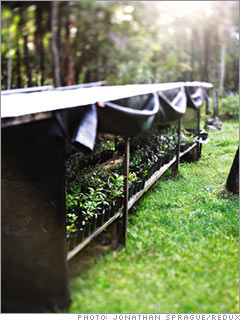Leaving Kailua-Kona, we make the two-hour drive across cattle-grazing land - cattle constitute a $16 million industry in Hawaii - to the rural Hamakua coast, a former hub for sugar cane. After a night in the lush city of Hilo - it rains 280 days of the year here - we are off to the town of Volcano in the morning. Our ultimate destination is Tea Hawaii (teahawaii.com), which grows tea and offers tours and tastings. The directions to owner Eva Lee's farm instruct us to turn onto a one-lane road and drive several miles through rain forest, ignoring the NO OUTLET AND DEAD END signs. A clay pot and a red stone driveway are the indications that we've arrived. Introduced to Hawaii roughly eight years ago, tea is grown by 12 farmers on the Big Island. They also hope it may become a major new crop for the state. For two years Lee has been giving tea tours out of her home by appointment and through Hawaii Community College. They are an important part of both her current income and her business's planned growth as a farm.
Nestled between lush forest and a bamboo-framed koi pond, Lee's home is a stunning blend of Chinese, Japanese and New England architecture. Designed by herself and ceramicist husband Chiu Leong, the home features an 875-square-foot central room with 22-foot ceilings and doors that slide open to the yard. There she serves visitors Hawaiian-grown tea in a traditional Chinese ceremony.
| |

